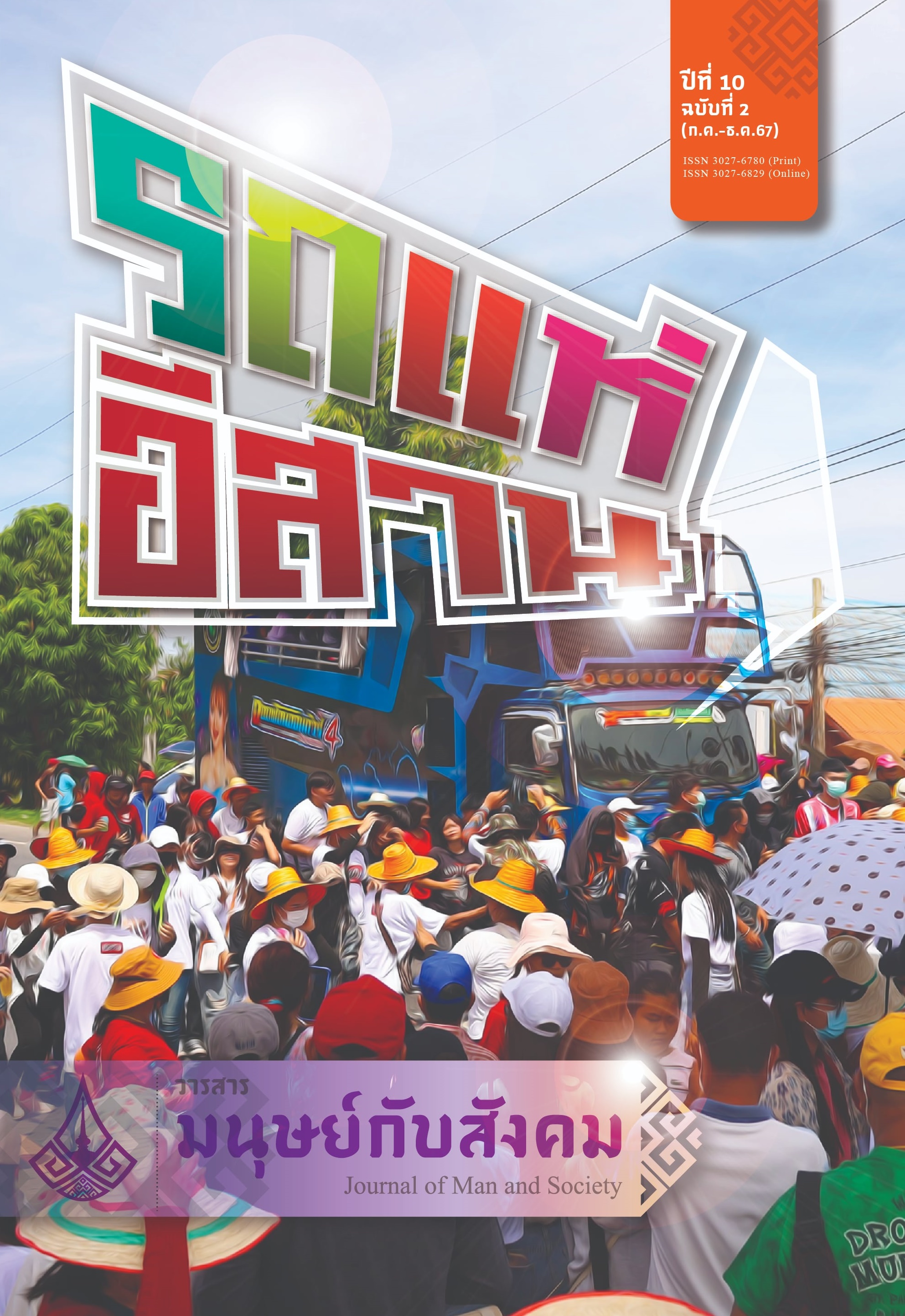พฤติกรรมการฟังพอดแคสต์และการเรียนรู้ภาษาอังกฤษของนักศึกษาชั้นปีที่ 1: กรณีศึกษา มหาวิทยาลัยศิลปากร
Main Article Content
บทคัดย่อ
งานวิจัยนี้มุ่งศึกษาพฤติกรรมการฟังพอดแคสต์และความชอบของนักศึกษาชั้นปีที่ 1 ที่ลงทะเบียนในรายวิชา SU202: ภาษาอังกฤษเพื่อการสื่อสารนานาชาติ ณ มหาวิทยาลัยศิลปากร วิทยาเขตสารสนเทศเพชรบุรี โดยใช้การวิจัยเชิงสำรวจ เก็บรวบรวมข้อมูลจากกลุ่มตัวอย่างแบบเจาะจงจำนวน 38 คน ผ่านแบบสอบถามออนไลน์ ผลการศึกษาพบว่า นักศึกษาส่วนใหญ่ฟังพอดแคสต์เพื่อการศึกษา โดยชอบตอนสั้น ๆ ที่สอดคล้องกับเนื้อหาหลักสูตร แม้ว่าการแพร่ระบาดของ COVID-19 จะส่งผลต่อรูปแบบการเรียนรู้ แต่พอดแคสต์ก็ได้กลายเป็นทางเลือกที่ได้รับความนิยม เนื่องจากมีความยืดหยุ่นและเข้าถึงง่าย การวิเคราะห์องค์ประกอบของรูปแบบพอดแคสต์พบว่านักศึกษาให้ความสำคัญกับเสน่ห์และวิธีการนำเสนอของผู้จัดรายการ รวมถึงความสะดวกในการเข้าถึงตอนเก่า ผลการศึกษานี้ให้ข้อมูลเชิงลึกสำหรับนักการศึกษา และผู้ผลิตพอดแคสต์ที่ต้องการพัฒนาประสบการณ์การเรียนรู้ผ่านพอดแคสต์ โดยเฉพาะในบริบทของการเรียนทางไกลและการเรียนแบบผสมผสาน
Article Details

อนุญาตภายใต้เงื่อนไข Creative Commons Attribution-NonCommercial-NoDerivatives 4.0 International License.
เนื้อหาและข้อมูลที่ตีพิมพ์ลงในวารสารมนุษย์กับสังคม ถือเป็นข้อคิดเห็นและความรับผิดชอบโดยตรงของผู้เขียนซึ่งกองบรรณาธิการวารสารไม่จำเป็นต้องเห็นด้วยหรือร่วมรับผิดชอบใดๆ
บทความ ข้อมูล เนื้อหา รูปภาพ ฯลฯ ที่ได้รับการตีพิมพ์ในวารสารมนุษย์กับสังคม ถือเป็นลิขสิทธิ์ของวารสาร หากบุคคลหรือหน่วยงานใดต้องการนำทั้งหมดหรือส่วนหนึ่งส่วนใดไปเผยแพร่ต่อหรือเพื่่อกระทำการใดๆ จะต้องได้รับอนุญาตเป็นลายลักษณ์อักษรจากวารสารมนุษย์กับสังคมก่อน
เอกสารอ้างอิง
Faramarzi, S., Elekaei, A., & Koosha, M. (2015). New insights into distance language learning. Journal of Applied Linguistics and Language Research, 2(8), 191-207. https://www.researchgate.net/publication/311708293_New_Insights_into_Distance_Language_Learning
Ferrer, I., Lorenzetti, L., & Shaw, J. (2020). Podcasting for social justice: Exploring the potential of experiential and transformative teaching and learning through social work podcasts. Social Work Education, 39(7), 849-865. https://doi.org/10.1080/02615479.2019.1680619
Grover, S. (2015, October). Predicting the adoption of video podcast in online health education: using a modified version of the technology acceptance model (health education technology adoption model HEDTAM). In E-Learn: World Conference on E-Learning in Corporate, Government, Healthcare, and Higher Education (pp. 1100-1104). Association for the Advancement of Computing in Education (AACE).
Lori, A. (2011). Podcasting, Cognitive Theory, and Really Simple Syndication: What is the potential impact when used together?. Journal of Educational Multimedia and Hypermedia, 20(3), 219-234. https://www.researchgate.net/publication/266211176_Podcasting_Cognitive_Theory_and_Really_Simple_Syndication_What_is_the_Potential_Impact_When_Used_Together
O’brien, A., & Hegelheimer, V. (2007). Integrating CALL into the classroom: The role of podcasting in an ESL listening strategies course. ReCALL, 19(2), 162-180. https://eric.ed.gov/?id=EJ812172
Pensute, C. (2018). Podcast, the New Media: Comparative Case Studies between USA and Thailand. NBTC Journal, 2(2), 271–290. https://so04.tci-thaijo.org/index.php/NBTC_Journal/article/view/145580
Saeed, N., Yang, Y., & Sinnappan, S. (2010, June). Effect of media richness on user acceptance of blogs and podcasts. In Proceedings of the fifteenth annual conference on Innovation and technology in computer science education (pp. 137-141).
Sinraksa, D., Soreb, S., & Sukpan, P. (2022). The Development of English Listening Comprehension Supplementary Material Using Podcast for the First Year English Major Students at Songkhla Rajabhat University. Journal of Education and Innovative Learning, 2(2), 97-108. https://so06.tci-thaijo.org/index.php/jeil/article/view/255801/173906
Supsinwiwat, R., & Setthajit, R. (2020). Gen-Y media exposure which affects the elements of the podcast programs. The Journal of Social Communication Innovation, 8(2), 125-135. https://so06.tci-thaijo.org/index.php/jcosci/article/view/246560
Tilokavichai, V., & Kongrattanaprasert, J. (2021). The Use of Podcasts to Promote Skills Development with Employees in Logistics Industry During the Covid-19 Situation. Journal of Accountancy and Management, 13(2), 26-41. https://so02.tci-thaijo.org/index.php/mbs/article/view/248690
Thongbai, N. (2019). Podcast: The New Choice of Audio Content. In The 14th National and International Sripatum University Conference (SPUCON2019): Research and Innovations for Thailand 4.0 (pp. 885-889).
Thongfook, K., & Pattmanon, P. (2016). Factors Effecting Online Media Consumption and The Awareness of Retail Banking Advisory Serviceof Salary Man In Bangkok: Case Study K-Expert. Journal of Rangsit Graduate Studies in Business and Social Sciences, 2(1), 68-77. https://doi.org/10.14456/jrgbsrangsit.2016.18


